EXTENDED! CO residents can apply FOR FREE through December 1st. Apply now!
Secure your scholarship offer in just 2-3 days through December 17! Get started.
No waiting. No guessing. Join us for Instant Decision Day on December 3. Register now.
EXTENDED! CO residents can apply FOR FREE through December 1st. Apply now!
Secure your scholarship offer in just 2-3 days through December 17! Get started.
No waiting. No guessing. Join us for Instant Decision Day on December 3. Register now.
Over three immersive days in the Yampa Valley in northwestern Colorado, community leaders from across the state gathered for the final stop on the Colorado Project’s Rural Learning Tour. Convened by the University of Denver’s Josef Korbel School of Global and Public Affairs and the Scrivner Institute of Public Policy, the Colorado Project is a statewide effort to advance shared prosperity, sustainability, and inclusive growth in every region of the state. The Yampa Valley convening offered a clear view of both the opportunities and challenges facing rural communities. Guided by the project’s cornerstones—sustainability and resilience, economic mobility and workforce, cost of living, and entrepreneurship and innovation—participants engaged directly with local partners who are shaping the Valley’s future.
The convening kicked off in Craig with a site visit to Fitch Ranch Artisan Meat Co, where we learned about small-scale meat processing supporting local ranchers. That visit was followed by a roundtable with local leaders including the City of Craig, the Small Business Development Center, and Memorial Regional Health, framing the region’s need for economic diversification, small business vitality, and healthcare access.
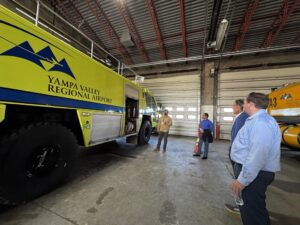
Day two in Hayden focused on infrastructure solutions, economic development, and workforce needs. A visit to the Yampa Valley Regional Airport showcased the need for creative transportation options to the region, which is approximately a 3.5-hour drive from Denver’s airport. An opening conversation with the Yampa Valley Community Foundation at the historic Hayden Granary grounded participants in regional history and values, and an economic development and workforce panel explored career pipelines, employer needs, and regional collaboration opportunities. A Hayden Heritage Walking Tour showcased main street revitalization efforts and community-led placemaking.
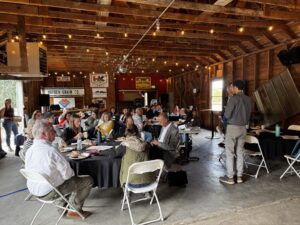
The final day underscored the valley’s creative and systems-level approaches. Site visits to Steamboat Creates and the Yampa Valley Foods Marketplace highlighted how arts, culture, and local food systems contribute to economic resilience. A session on mental and behavioral health support examined cross-organization coordination to improve access and outcomes. A cost-of-living panel with representatives from Colorado Mountain College, the City of Steamboat Springs, Yampa Valley Housing Authority, Northwest Colorado Health, and Routt County surfaced strategies around attainable housing, childcare, and workforce stability. The convening concluded with a collaborative session focusing on key takeaways from the Rural Learning Tour and exploring next steps for the Colorado Project, with participants affirming their commitment to continue engaging.

The Yampa Valley convening underscored that rural Colorado is actively building solutions, linking energy transition and infrastructure planning with workforce pathways, pairing cultural and agricultural assets with entrepreneurship, and aligning local leadership around attainable housing and community wellbeing. As the Rural Learning Tour concludes, lessons from the three convenings—Northeast Colorado, the San Luis Valley, and the Yampa Valley—will inform the Colorado Project’s evolving roadmap for inclusive and resilient growth, ensuring that rural ingenuity remains central to Colorado’s future. Stay tuned for the project’s next steps!
Colorado – From October 8–10, 2025, a diverse group of leaders from across Colorado will convene in Northwest Colorado’s Yampa Valley as part of the Colorado Project’s Rural Learning Tour. The Colorado Project is a statewide initiative designed to advance shared prosperity and inclusive, sustainable growth in all regions of Colorado. It is convened by the Josef Korbel School of Global and Public Affairs and the Scrivner Institute of Public Policy at the University of Denver.
Now in its second iteration, the Colorado Project is focusing on the distinctive challenges rural communities face and the innovative, locally driven solutions they are generating. The Learning Tour seeks to elevate this ingenuity, highlighting creative interventions in sustainability, economic mobility, and entrepreneurship.
The Yampa Valley convening will spotlight local leadership in climate action, housing affordability, workforce development, and economic diversification, with site visits across Craig, Hayden, and Steamboat Springs. Participants will learn about the Hayden Geothermal Industrial Park, explore collaborative land-use and downtown revitalization efforts, and engage with community-driven initiatives like Steamboat Creates, the Yampa Valley Food Marketplace, and the Yampa Valley Housing Authority.
Tammie Delaney, co-host in Hayden and community leader, emphasized the unique nature of the Valley: “The Yampa Valley is at the crossroads of tradition and transition. From ranching to renewables, we are learning how to preserve what makes this place special while preparing for the future. The Colorado Project gives us a chance to connect these efforts to a broader statewide conversation.”
Tim Wohlgenant, co-host and President and CEO of the Yampa Valley Community Foundation, highlights the importance of the Learning Tour coming to the Valley: “This tour is about elevating local voices and making sure rural Colorado is not left behind. By bringing people together across sectors, from housing and healthcare to energy and the arts, we’re building the partnerships that will shape a resilient future.”
Participants will also engage in panels on economic development and workforce, explore mental and behavioral health systems collaboration, and discuss collaborative solutions to address the Valley’s rising cost of living. The convening will close with a session dedicated to actionable next steps and commitments to align local solutions with statewide strategies.
The Yampa Valley is the final visit in the 2025 Colorado Project Learning Tour. It follows successful convenings in Northeast Colorado (June) and the San Luis Valley (August). Although this Learning Tour is drawing to a close, the project will continue to highlight success stories that lead to actionable policy solutions for the state.
Over three immersive days in the San Luis Valley, community leaders from across Colorado gathered for the second stop on the Colorado Project’s Rural Learning Tour. Convened by the Josef Korbel School of Global and Public Affairs and the Scrivner Institute of Public Policy, the Colorado Project is a statewide effort to advance shared prosperity, sustainability, and inclusive growth in every corner of the state. The San Luis Valley convening offered a vivid look at both the opportunities and challenges in rural Colorado. Guided by the Colorado Project’s four cornerstones — Colorado’s Promise, Sustainability and Resilience, Economic Mobility and Workforce, and Cost of Living — participants engaged directly with agricultural entrepreneurs, educators, nonprofit leaders, and civic partners who are shaping the future of their communities.
From the outset, the convening highlighted the Valley’s spirit of collaboration and resilience. At Adams State University, participants heard from President Dr. David Tandberg and community leaders on how educational institutions serve as an anchor for economic mobility across the region. Conversations at the Valley Roots Food Hub revealed the importance of strengthening local food systems and connecting family farmers to markets. At the Center Viking Youth Club, youth leaders and educators shared how mentorship and career-connected learning are expanding opportunity for the next generation. Tours of White Rock Specialties and discussions at the Colorado Farm Brewery demonstrated how creative agriculture ventures can drive economic growth.
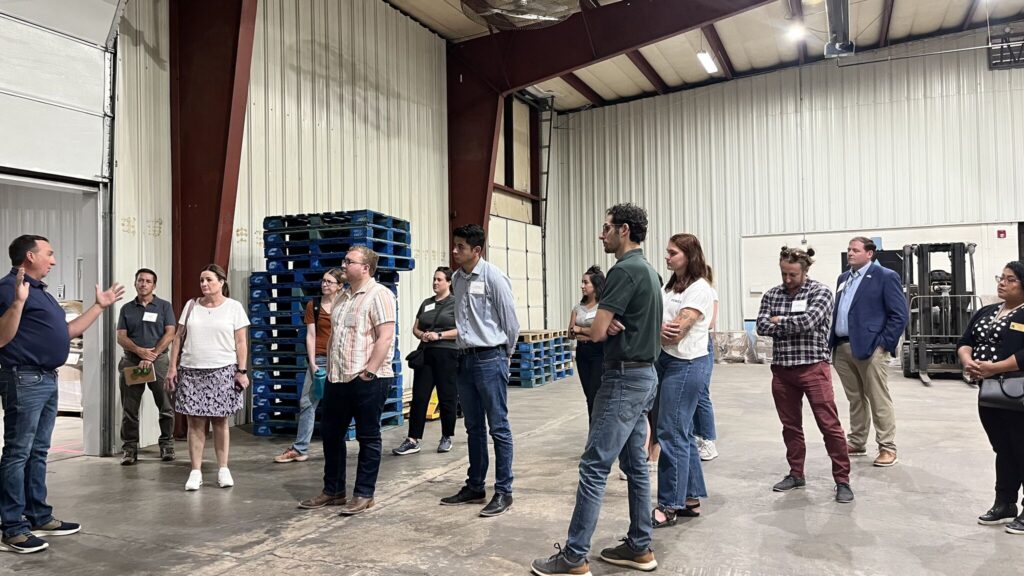
The final day brought innovation to the forefront. Participants began with a field demonstration of Barn Owl Precision Agriculture’s Autonomous Nano-Tractor, an AI-powered robot designed to help farmers and producers weed their crops in a more sustainable way. The demonstration offered proof that cutting-edge technology can support agricultural producers in ways that increase productivity while prioritizing sustainability and saving costs. At the Ski Hi Complex in Monte Vista, The Attainment Network’s San Luis Valley Career-Connected Partnership outlined pathways for training the local healthcare workforce, highlighting how collaboration between institutions can prepare local students for in-demand jobs while addressing pressing community needs. The day concluded with a panel hosted by the LOR Foundation, which highlighted their unique approach of listening locally, acting quickly, and investing in community-driven ideas to create lasting change in rural communities.
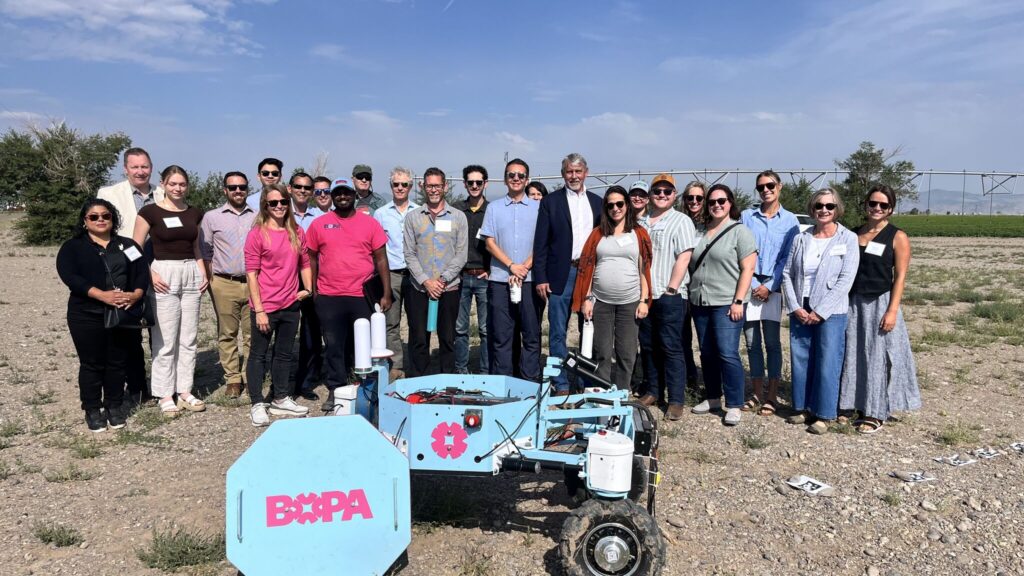
The San Luis Valley convening underscored that rural Colorado is not waiting on solutions, it is creating them. From agricultural innovations to career-connected education and community-led philanthropy, the Valley’s leadership is creating models that can inform the rest of the state. As the Colorado Project continues its Rural Learning Tour with an upcoming stop in the Yampa Valley, these lessons will carry forward as a roadmap for statewide prosperity. The San Luis Valley left participants with inspiration to honor the ingenuity of rural communities and ensure their innovations are woven into Colorado’s future.
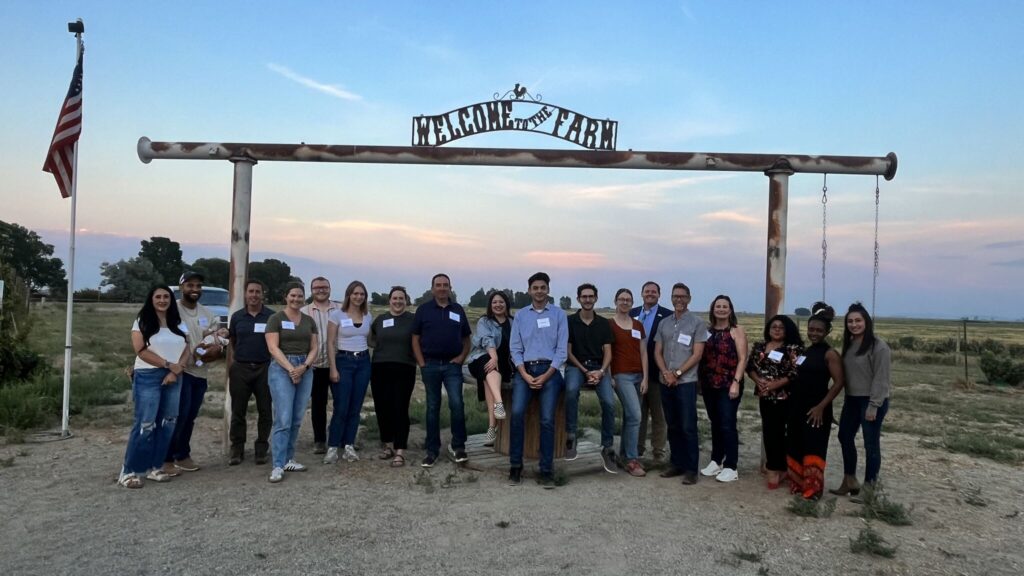
Over two immersive days in Sterling, Colorado, community leaders from across the state gathered for the inaugural stop on the Colorado Project’s Rural Renaissance Learning Tour. The Colorado Project, convened by the Korbel School and the Scrivner Institute, is a unique statewide effort to advance shared prosperity and sustainable and inclusive growth in every corner of the state. The Sterling convening offered insights into the opportunities and complexities of life in Northeast Colorado.
With a focus on the project's four cornerstones—Colorado’s Promise (access to prosperity in all Colorado communities), sustainability and resilience, economic mobility and workforce, and cost of living—participants engaged in on-the-ground conversations with local business owners, farmers, educators, elected officials, and civic leaders. The convening underscored a clear theme: rural communities hold important innovations for Colorado’s future, but they must be included in the conversations on long-term strategies.
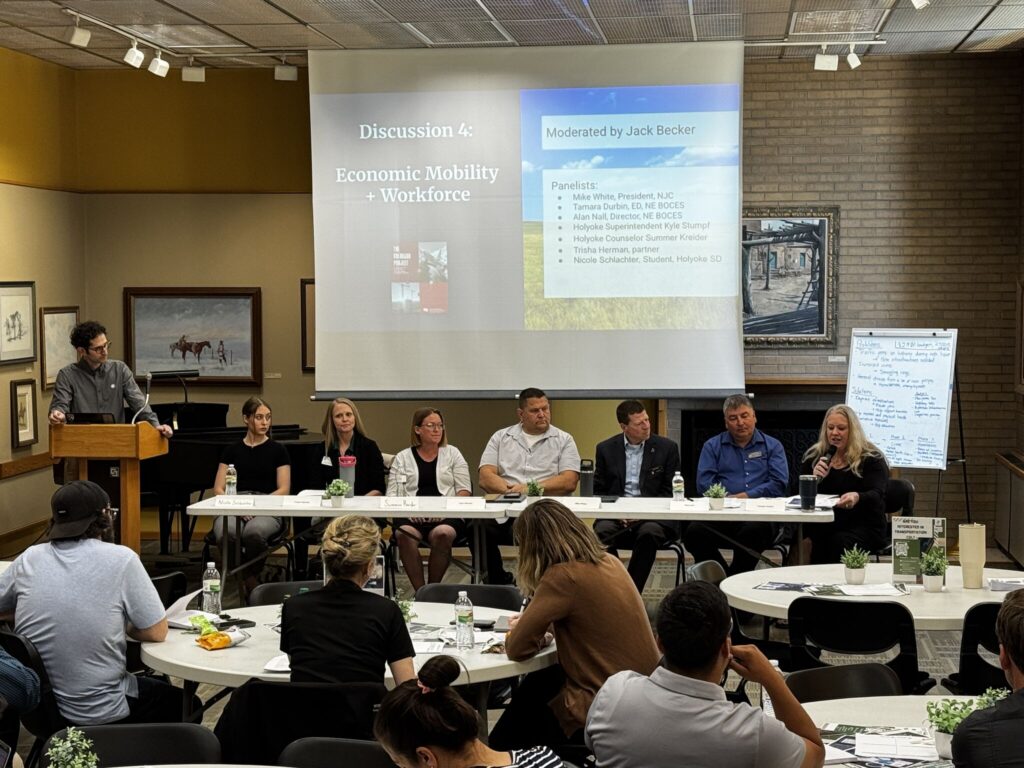
Regional Insights with Statewide Impacts
From touring wind turbine sites that are already creating skilled local jobs, to hearing K-12 and higher ed educators outline new career-connected programs, the convening offered a vivid snapshot of both successes and gaps. Participants examined local labor trends, housing affordability, sustainable energy, and economic infrastructure—all through the firsthand perspectives of those that live and lead in the region.
“Rural prosperity is Colorado’s prosperity--our future depends on every county thriving,” said Laurie Jones, Director at the Small Business Development Center in Sterling. Her words became a refrain across the convening, resonating with both first-time visitors and longtime regional partners.
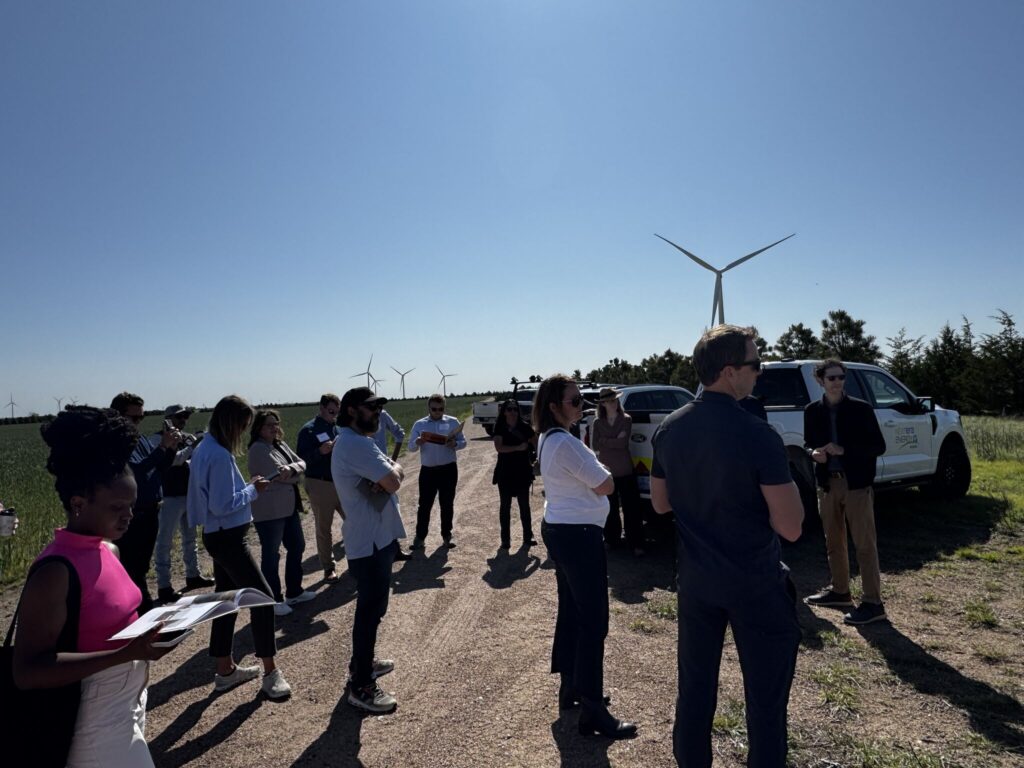
From Listening to Action
The convening was not just a listening tour; it was a platform to build. Sterling’s collaborative spirit and deep-rooted leadership provided a springboard for actionable ideas: from broadband and tech apprenticeships to renewable energy projects and local entrepreneurship support. This work will help shape the statewide playbook for investing in rural prosperity.
Sterling marked a powerful beginning for the Colorado Project. With the next stop in Alamosa scheduled for August, the Colorado Project continues to elevate community-driven insights into long-term strategies for rural success. It is laying the groundwork for a more inclusive, connected, and resilient Colorado.
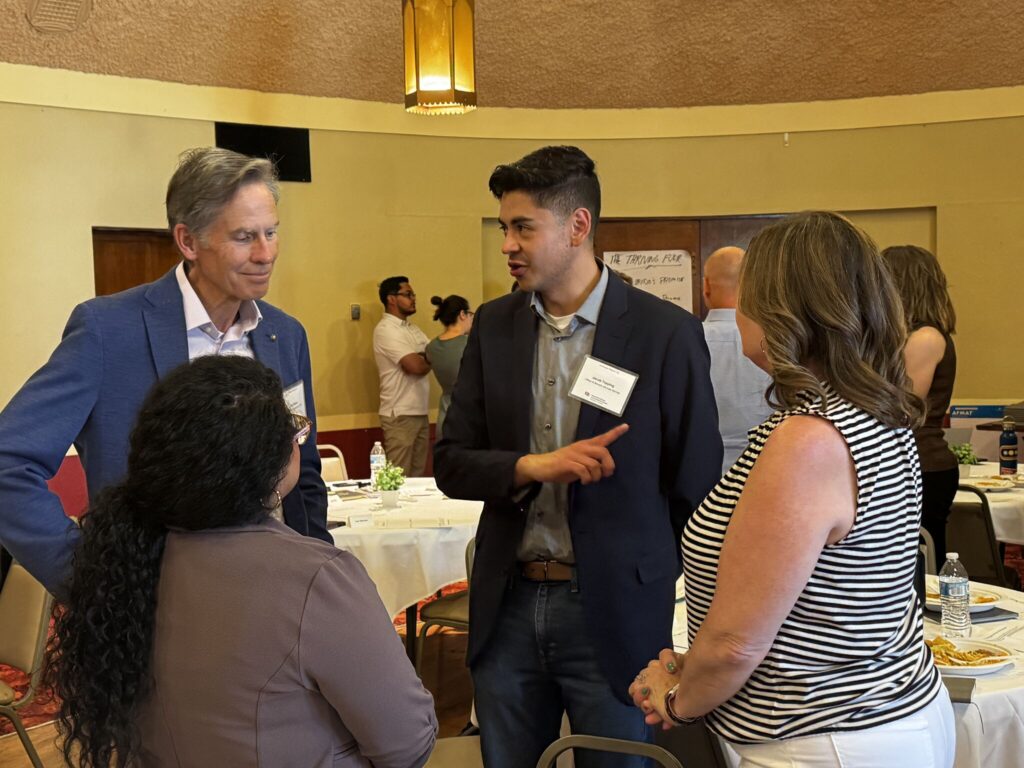
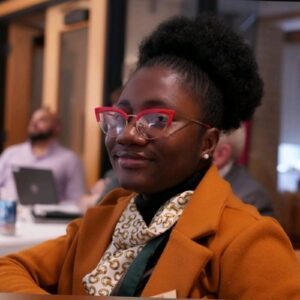
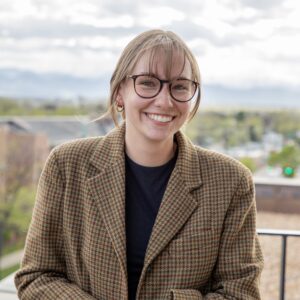
1. You two are the current leaders of the Korbel Policy Society, the student organization for MPP students and others interested in policy. Can you share your experience leading KPS, and describe one thing you are particularly proud of implementing with KPS?
This has been a bit of a rough year in terms of student engagement, but we are proud to continue to offer Korbel Policy Society as a space for MPPs and other policy-interested folk at the University of Denver to socialize outside of class, discuss public policy, and make friends across cohorts. We are especially excited for our spring quarter initiative: featuring MPP alumni on the Korbel CareerCast podcast. While we originally planned an in-person alumni panel, we quickly recognized that busy schedules and limited availability in the spring quarter posed a challenge. To ensure our event remained accessible to all while preserving our valuable connection with alumni, we pivoted to a recorded, virtual format. This shift allowed us to continue sharing alumni insights and experiences in a flexible way, making their stories available to a wider audience of students, anytime.
2. What influenced your decision to pursue an MPP at Korbel?
Olivia: I see public policy as the ideal conduit for translating research-informed policy mechanisms into practical public service. In the classroom, we not only discuss the political process and theoretical elements of successful policy, but real-world applications and complications. I fell in love with policy problems in my undergrad at DU, and remaining here to pursue an MPP was the logical choice to continue learning and growing from Korbel’s broad and diverse knowledge base.
Otiwaa: My decision to pursue a Master of Public Policy at the Korbel School was driven by both my professional experience and a strong desire to effect significant change through policy. My first master's degree was an MBA in International Business, and I worked for a global mining logistics organization. However, I have always appreciated community engagement work, whether non-profit or not. I sought a career that would allow me to combine all of these things. Korbel appealed to me not only for its strong emphasis on international politics and global policy, but also for its interdisciplinary approach, which combines economics, governance, development, and ethical leadership. The chance to learn from practitioners, participate in real-world policy simulations, and interact with a diverse cohort made it the perfect setting for me to hone my talents and broaden my impact.
3. Which class(es) in the program have been the most impactful so far?
Olivia: I’ve really enjoyed the specialization component of the MPP degree, as it allowed me to build upon the base knowledge of the core public policy classes and explore a policy arena that I was particularly interested in. I chose to pursue the Homeland Security certification, introducing me to security-specific policy issues as well as the field I currently work in today, Emergency Management.
Otiwaa: Several classes have been especially impactful during my time at Korbel. Introduction to Public Policy Analysis was foundational—it set the tone for how I approach policy problems critically and systematically. I also really enjoyed the Social Impact and Sustainability Lab, which allowed me to explore practical ESG strategies, and Negotiating Conflicts and Environmental Policy, where I developed tools to navigate complex environmental and stakeholder dynamics
4. What are your career goals, and how do you think the MPP program is preparing you for this career?
Olivia: I’m focused on enhancing my knowledge of current policy problems in the Emergency Management space, particularly surrounding critical infrastructure and wildfire preparedness. Long-term, I hope to address these problems at the state or federal level to help strengthen the nation’s preparedness as natural disasters become increasingly frequent. The MPP program has prepared me to face these challenges with analytical experience and by valuing dissenting policy opinions in the search for the solution.
Otiwaa: My career goal is to lead in ESG and corporate responsibility strategy, helping businesses align their operations with social and environmental impact. The MPP program is equipping me with the analytical, negotiation, and policy design skills I need to drive that change—bridging the gap between business goals and public good.
5. What is one piece of advice you would offer to the Korbel Policy Society moving forward? Why do you think students should join/engage with KPS?
We both could not recommend involvement in student organizations more! Grad school can be difficult and isolating at times, and it is important to surround yourself with people who can motivate you through the challenges and celebrate the successes. Even if it’s not our club, find something at Korbel that allows you to step out of your cohort and learn from/lean on others.
6. What do you like most about living and studying in Denver? Do you have a favorite place or activity in town you want to share with our community?
Olivia: After a lifetime of horrible winters growing up in Cleveland, I have come to love the year-long sunshine of Denver. A random Wednesday in March could be a beautiful 75-degree day, opening opportunities for park days and long runs well before summer. At the moment, runs around Wash Park or afternoon happy hours at Denver Beer Company are getting me through spring quarter.
Otiwaa: What I enjoy most about Denver is how easy it is to connect with nature. Growing up in Ghana and spending nearly seven years studying in Morocco, I’ve always found peace and clarity in the outdoors. Hiking at Red Rocks or around Golden has become one of my favorite ways to unwind and reflect—it’s fun, refreshing, and keeps me grounded as I navigate grad school.
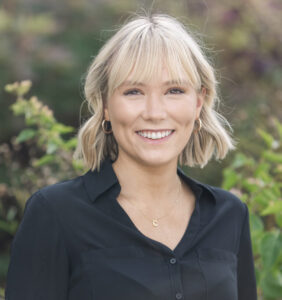
1. When did you attend DU, and what influenced your decision to enroll in the MPP program?
I attended DU from 2019-2023, beginning as an undergraduate student studying public policy and socio-legal studies, and then joining the MPP program through the 4+1 track. I was drawn to DU’s MPP program early on because of the fantastic opportunity to complete my graduate studies in parallel to my undergraduate work, and I loved my experience as a part of the undergraduate public policy program so knew it would be a great fit for me to stay at DU and pursue my MPP at Korbel.
2. What has been your career path since earning your MPP? How did the program help prepare you for what you’re doing now?
Since graduating, I have been a part of an organization called Whiteboard Advisors -- a social impact firm that works across research, policy advocacy, and communications to unlock educational and economic opportunity. I started with Whiteboard Advisors as an intern while finishing my MPP, and transitioned to an Associate role upon graduation before moving up to my current position as a Senior Associate. The practical, real-world skills I learned in the MPP program helped prepare me for my current role by being able to critically analyze existing policies, understand all possible implications, and come up with creative ideas that then inform conversations with state and school district leaders to drive more meaningful outcomes for all students.
3. What class(es) was/were particularly impactful? Do you remember some that changed the way you think about the world and/or helped you to improve your practical skills?
The most impactful class for me was The Policy Lab, because it was the most hands-on, directly applicable representation of developing a creative policy solution and taking the steps needed to make it successful. It was a great bridge between education and practice, and provided a unique opportunity directly engage with lawmakers in a meaningful way before even finishing the program.
4. How would you describe the most valuable aspect of your time in the MPP program, whether academic, professional, or personal?
The most valuable aspect of my time in the MPP program was developing my Capstone project, which focused on improving outcomes for at-risk students in Colorado. Working on this project not only helped me expand my subject matter expertise on an issue that would eventually become a key focus of my career, but also helped to develop my background in conducting in-depth policy research that requires identifying any and all potential implications of a potential programmatic solution. These are skills I use every day in my career, and that help me bring a more critical eye to policy in a way that allows for more creative interpretations of how to utilize policy to support student better student outcomes.
5. What advice would you give to current MPP students?
My advice to current students would be to keep an open mind about the policy areas you want to explore. Take classes outside of your primary interests, because they can provide valuable insights that you may not expect. For example, even though I now work in education policy, I have found that my coursework in health and water policy helped to broaden my thinking and expand my perspective on unique and creative ways to shape and interpret policy solutions.
6. What is a favorite story or memorable moment from your time as a student?
One of the most memorable moments from my time in the MPP program was our cost-benefit analysis class. It was one of the most difficult classes I took throughout the entire program, but also proved to be one of the most useful and rewarding. It definitely became a bonding experience for our cohort -- we all leaned on each other to help figure things out and eventually all get to a place where we could successfully complete a CBA.
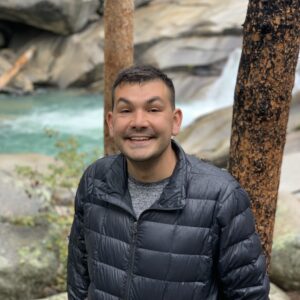
1. What inspired you to join the Scrivner Institute and MPP program at Korbel?
When I saw the job posting in December 2023 for a new teaching-line faculty position, I was imme1diately intrigued. I myself have a Master of Public Policy (MPP) degree (Harvard Kennedy School, Class of 2019) and have found over the years that the degree’s emphasis on systematic and evidence-based approaches to research, reasoning, and implementation have served me well. Since arriving on campus, I have been energized by the Scrivner Institute’s momentum and am continually impressed by my student and faculty colleagues, who are hard-working, brilliant, possess integrity, and are committed to the public good.
2. What are your research interests and areas of expertise?
I study issues of urban planning; housing, land-use, and transportation policy; state and local politics and policy; and policy implementation. I conduct research on these topics in both international and domestic contexts: my PhD dissertation examined issues of post-apartheid planning for multi-racial and multi-ethnic democracy in South Africa, and much of my current work considers local urban policies related to housing and land use in the contemporary Colorado context.
3. What courses do you teach?
This past year, I taught courses in Urban Policy, Ethics in Public Policy, Policy Writing, and Public Policy Analysis. I also taught a “Policy Lab” course on Housing Policy.
4. What is an assignment/activity that you look forward to in your courses?
I have enjoyed developing client-driven courses in partnership with engaged, relevant, professional policy practitioners. Students work in teams and interface with these clients to produce timely products that can inform ongoing policy decisions and rollouts. This year, I have curated active course partnerships with the U.S. Department of State (through its “Diplomacy Lab” initiative), the Colorado State Office of Economic Development and International Trade (OEDIT), and the City and County of Denver’s Affordable Housing Review Team (AHRT) and its Community Planning and Development (CPD) and Housing Stability Teams (HOST). Next year, I’m looking forward to developing an additional partnership for students with the Lincoln Institute of Land Policy.
5. What do you believe is a unique contribution you bring to the MPP program/Scrivner Institute?
I am born and raised in Colorado, and have long been passionate about issues of Colorado politics and policy. I have also spent considerable time on the east coast of the United States and have lived and worked internationally. I believe I bring a policy perspective that is at once locally grounded and in tune with national and global policy conversations. I hope to strengthen the Scrivner Institute’s topical expertise on issues of urban policy, state and local politics and policy, and implementation, and further skills-based courses in writing and public policy analysis. My client-driven courses aim to ground the MPP program and Scrivner Institute in professionally relevant experiential learning.
6. Could you share more about a project or projects you are currently working on?
I am currently working with colleagues across the university on issues of affordable housing in Colorado, with an aim to study precise drivers and causes of Denver’s affordability crisis. This collaborative work has involved engagements with faculty at CU Boulder, CU Denver, and Metro State, among other institutions across the U.S., and involves leveraging a novel policy simulator model to gauge the effect of policy changes on affordable-housing development potential. Envisioned outcomes include academic journal articles, a public-facing policy white paper, and newspaper articles.
7. What is a favorite memory from your time as a faculty member so far?
In March 2025, I convened a symposium event at the end of my Ethics in Public Policy class where students invited individuals whom they considered to be ethical public leaders to campus. At the event, students shared their final philosophical papers and/or public-leader interviews with attendees and bonded over food and drink. It was a tremendous culmination to a quarter of engagements with questions of ethical decision-making in this contemporary moment.
8. What do you like most about living and working in Denver? Do you have a favorite place or activity in town you want to share with our community?
I love living in Denver! My wife and I live right next to Harvard Gulch Park and a favorite activity is simply a daily walk around the park, or perhaps a walk or bike ride into work on the DU campus. If anyone is looking for some incredible ice cream in the area, do check out Right Cream!
9. Any additional fun facts about yourself?
My wife and I are expecting our first baby this June! I am thrilled about the prospect of us setting down roots in Denver and continuing to learn, grow, and contribute to the DU, Korbel, and Scrivner Institute communities.

What makes you feel safe? Is it a familiar voice on the phone, a particular place, friends or family by your side, your spiritual beliefs or even a favorite blanket?
What about a person outside your personal circle, like a paramedic, a lifeguard, a firefighter or a police officer?
20-year-old Joseph said that people should feel safe around police officers, but that isn’t always the case in Durham, North Carolina—where he lives—and elsewhere.
He says, “I think that police officers almost have to have a—not necessarily nurturing aspect, but kind of like a—sense of safety about them. Because you should feel safe around police officers, you know? I don’t necessarily know how to put that in a word, but I think that you should definitely just feel safe around police officers.”
So how can police departments increase safety and earn trust in the communities where they work?
University of Denver Assistant Professor of Public Policy Ajenai Clemmons’ research answers these questions that can extend beyond North Carolina.
On this episode of RadioEd, co-host Jordyn Reiland chats with Clemmons about how the men she interviewed made sense of policing in their neighborhood—and what they needed to both be safe and feel safe.
Clemmons is an assistant professor of public policy at the Scrivner Institute. She researches the policing of marginalized communities in democratic contexts, particularly the United States and Europe. She teaches courses on the politics of the policymaking process, intersectional inequality, as well as state violence and local security.
What the Durham Police Department Can Do to Enhance Safety and Earn Trust
RadioEd S5E3:
Guest: Ajenai Clemmons, Assistant Professor of Public Policy at the Scrivner Institute
Jordyn Reiland (00:04)
You're listening to RadioEd, the University of Denver podcast. I'm your host Jordyn Reiland.
What makes you feel safe? Is it a familiar voice on the phone, a particular place, friends or family by your side, your spiritual beliefs or even a favorite blanket?
What about a person outside your personal circle, like a paramedic, a lifeguard, a firefighter or a police officer?
20-year-old Joseph said that people should feel safe around police officers, but that isn’t always the case in Durham, North Carolina — where he lives — and elsewhere.
He says, “I think that police officers almost have to have a—not necessarily nurturing aspect, but kind of like a—sense of safety about them. Because you should feel safe around police officers, you know? I don’t necessarily know how to put that in a word, but I think that you should definitely just feel safe around police officers.”
So how can police departments increase safety and earn trust in the communities where they work?
University of Denver Assistant Professor of Public Policy Ajenai Clemmons’ research answers these questions that can extend beyond North Carolina.
Clemmons’ work around policing began in 2004 when she worked as a Community Relations Ombudsman in Denver. During that time Clemmons helped create a new government agency called the Office of the Independent Monitor.
Ajenai Clemmons (01:24)
This was in response to some very high-profile incidents, some officer-involved deaths of civilians in Denver and so the city, the citizens rose up. The city came together across all agencies and volunteers from the community as well, to study new systems of civilian oversight that could improve transparency and accountability for public safety in Denver.
Jordyn Reiland (01:49)
The role of the Office of the Independent Monitor allows for an outside party to ensure law enforcement investigations are fair, thorough and timely and that any discipline is reasonable and appropriate.
Civilian oversight of law enforcement is something that's been around for some decades now, but it looks different in every city. Civilian commissions or boards exist in cities throughout the country including Los Angeles, Chicago, Kansas City, Missouri and Detroit.
Clemmons also spent time in Washington, D.C. between 2010 and 2015, where she was the policy director for a national professional association of Black state legislators.
At that time there were a series of high-profile shootings across the country, including Travyon Martin, Michael Brown, Eric Garner, Tamir Rice, Sandra Bland and Freddie Gray.
Clemmons’ interest in policing of marginalized communities only grew from there.
In 2018 until just before the onset of the pandemic, she conducted in-depth interviews with 18- to 29-year-old African American men—like 20-year-old Joseph, who we heard from earlier. These men lived in the most economically distressed, high violent crime areas in Durham.
Clemmons’ work sought to understand how they made sense of policing in their neighborhood — and what they needed to both be safe and feel safe.
She acknowledged the challenges of conducting this type of research in the community and wanted to find ways to ensure people felt the most comfortable sharing their thoughts — positive or negative.
Ajenai Clemmons (03:10)
I went out on foot into these neighborhoods and recruited them. I was in barber shops, I was on basketball courts talking to young men during halftime and trying to pull them aside to see if they were interested in my study. I was hitting the streets. So we did these interviews in a private location. I wanted them to be confidential so that people could be candid. These are very complex feelings that people have, and I wanted them to feel that they could be vulnerable, that they could feel comfortable to be fully honest about whether their experiences were negative, whether they were positive or whether they were neutral, that they would have the full range to discuss whatever they wanted. I was very honored that they were so forthcoming. And they didn't sugar coat anything, and they didn't hold back. And it wasn't just..they were also self-reflective. They talked about what their experiences were like as kids, as youth, as teenagers, you know, being angry, whether they had a chip on their shoulder or not, or whether they were trying to stay out of trouble, and the kinds of ways that they... the kinds of things that they did to keep themselves safe.
Interlude
Jordyn Reiland (04:44)
Why don't people trust the police?
Ajenai Clemmons (04:46)
Yeah, this is a very big question. It's simple, but it's actually complex in a lot of ways. So in a nutshell, people don't trust police when they feel like they're not doing their jobs. They trust police when they feel under policed, when they feel that police are not competent, and I'll talk about that in a second. And they also feel they don't trust police. When they feel that police are being abusive and they're harming them. So they're sort of over policed, right? So these are the neighborhoods that I study. I literally study neighborhoods that are considered by their residents to be over policed and under policed. So in these communities, there's this intense police presence. Residents are stopped on foot or in their vehicles in a way they describe as constant, intrusive and harassing. They describe many officers as quick to accuse them of wrongdoing, right to curse at them and to use unnecessary and excessive force. Yet in these same neighborhoods, in spite of all the police activity going on, they still face high levels of crime, right? And that includes violent crime, and so this causes stress and insecurity on their part. So there's this sense that you know there are all these police around, but they're not there when you need them, right, or they're not in the right spots or focused on the right priorities, or they don't care about us.
When people feel abandoned and neglected, sometimes they distance themselves in return. And so it goes beyond this sense of trust or mistrust, it can breed legal cynicism. And cynicism is this orientation in which the law and agents of its enforcement, like the police and courts, are viewed as illegitimate. They're viewed as unresponsive and ill-equipped to ensure public safety, and that's a definition from Kirk and Papachristos. So it is very much a sense of feeling alienated. And that can go beyond police. It can extend to the judicial system writ large. But when this happens, when people don't trust police anymore and they are cynical toward them, it's rational from the perspective of looking at an individual, but it actually harms the community as a whole, because what happens is that people won't report crime as much, right? They won't cooperate with investigations, they won't serve as witnesses in the court of law as readily, and this can make it very hard to bring people who commit crimes to justice, and I'm not talking about, you know, unserious crimes. I'm talking about serious crimes. And so, you know, these folks are not held accountable, and they are, in fact, making the community less safe. And then this further breeds the cynicism. It's a vicious cycle, because then people see folks running around who are threatening the community, and so then they even feel further alienated, as they feel that the police don't care about them.
Jordyn Reiland (07:55)
Wow, that must be so challenging, and it kind of alludes to what you were talking about with the different meanings and thoughts about safety. And I think you said feeling safe and being safe, if that's correct. Could you talk a little bit about that?
Ajenai Clemmons (08:11)
So in general, a lot of people assume that if crime numbers go down, then they will feel more safe, and that's actually not true. The perception of safety is completely independent of whether or not you are safe or your risk level. So crime went down for years, decades even, and people's assessment of the risk of crime really hasn't changed. And sometimes it went up, even though the crime was going down, depending on where you were. So those are two different things, and it actually makes police, their job tougher, because they do have that accountability of bringing down the crime levels. But then people can feel that way regardless. And so then they have to dedicate some considerable resources to making people feel safer.
In this context, though, there really is unacceptable levels of violent crime and so even though it's a tiny proportion of the population that's carrying it out, it is significant. And in a lot of it, there are innocent bystanders that get caught in the middle. And in fact, out of the men that I interviewed, eight had been shot at least once, and four of those were folks who were caught in the crossfire who didn't have any idea who the shooter was or were mistaken by the shooter for someone else. And then additional men that I interviewed who literally were at a bus stop, waiting for their bus to arrive to go to work, and ended up having to dive for cover as bullets whizzed past them, because somebody saw somebody that they had been looking for, and then, just without regard to the circumstances, just opened fire. So there really is an extraordinary level of risk in these particular neighborhoods, and so it is important for people to both be safer and to feel safer, and so I wanted to make sure that I was being intentional in pulling out those two things in the interviews.
Jordyn Reiland (10:36)
One question that you asked stood out to me, and you said, “If you had a magic wand and could make a perfect interaction happen between an officer and a civilian, what would you do?” And you said you can choose any scenario. Did any of those answers surprise you?
Ajenai Clemmons (10:52)
On the whole, most answers tried to find some sort of win-win. They tried to find some sort of reconciliation between both parties and ensure that that was a positive interaction. And so it wasn't the case that most people's first thought was to just take care of the needs of the civilian. That in that perfect scenario, they really did seek a win-win. And so I was struck by that. A lot of the men did use their wishes to also undo the deaths of the men who had been killed that we talked about earlier, those high-profile deaths that had happened across the country, there was a recognition of that. And it was something that all but one interview we related to on some level, that they could see themselves in those men who had died, or in those people who had died. We certainly want to take into account the women who have been killed as well. So they actually use their magic wand to undo those deaths and to undo the harms that have happened.
Jordyn Reiland (12:10)
You highlight five themes that emerged as the most desired characteristics for officers, including those who are just communicative, invested composed and discerning and adaptive in their decision making. Can you paint a picture for me of the ideal police officer?
Ajenai Clemmons (12:30)
There is not one person that I spoke with who thought that being a police officer was an easy job. Folks were very quick to say it is a hard job. Not everybody should be a police officer, there are a lot of things to manage. It was about being constitutional. People were clear about that. It was making sure that you're observing people's rights, that people are innocent until proven guilty—that officers are truly just in how they enforce the law.
But it goes beyond that. Really, they wanted officers to have integrity. They wanted officers to be good people. And I think this is because this is really the most powerful person in their lives. They're the only person who can literally take life. And so it is important then that people who hold the most amount of power are actually good and righteous, and because you don't have the opportunity to see officers outside of these sort of emergency situations, or time pressure situations, you need other opportunities to observe their behavior, to know if they're trustworthy, right? To know if you can bring confidential information to them, to know whether they will keep confidence and so this is where you know they wanted to see officers' character on display. How do you do that? Well, they got to get in the community. They’ve got to get involved.
Jordyn Reiland (14:14)
Clemmons said that what surprised her about her research in Durham was people’s inherent desire to have a connection and a relationship with law enforcement.
Ajenai Clemmons (14:22)
Now maybe because they can't tell who's a safe officer and who's not a safe officer, and because there's so much unpredictability that is possible in those interactions, having positive encounters and having incredibly scary negative encounters, the safer thing to do could be to avoid police. To try to minimize the possibility of an experience, right? To keep a low profile.
But that ideally in their heart of hearts, many wished that they could just casually walk up to a police officer, say hi, chat, check in, or have that police officer do the same. That in their ideal world, that's what the general relationship would be between the police and the community. That you would see officers jumping in and playing double dutch, or joining in a pickup game of basketball or guiding a young person and talking to them about healthy life choices that those officers would be leading by example, that they would be a fabric of the community, that they would be rolling up their sleeves, and serving food and soup kitchens. And so there were so many ways that they saw police as able to be a force for good that I didn't expect. I didn't expect that level of specificity and of richness and of desire in elevating, actually, the importance and the impact that officers could have.
I also want to add a quote that I think exemplifies this desire for a better relationship and what it would take in order for officers to build trust in the community. So I named this interviewee, Marcus, and he's 25. This is what he says:
“Get police to come out here in these neighborhoods where a lot of these people are getting shot and killed and do something. Make a difference. Go drop off flowers at some of these people's graves. Act like a human being. You want the community to trust you? Do something for the community. Communication. Do a fundraiser. Do a get together, throw a police parade, you know? How many cops are out here, genuinely just to protect and serve? If, instead of judging us, officers would be more prone to trying to get to know the people they see every day, we wouldn't have so many problems with law enforcement and young black men in the communities. Pull up to the basketball court, play some ball with us. Throw a football with us. They're all frisbee for all I care. But do something."
Jordyn Reiland (17:15)
Yeah that really gets to the heart of that aspect of trust building and community involvement and really harkens back to just wanting to have that dual interaction.
Ajenai Clemmons (17:28)
You know, sometimes we can overthink what it would take for officers to create connections. But the desire is already there. It just needs an opportunity to be tapped into. And so it can be so many simple little things that officers can do to connect with folks in a way that's authentic, in a way that's joyful, to have that organic experience. And so those are the things that I'll be researching in the future and working on – like matching officers, even, with opportunities to connect and in activities like anything from this basketball or something sports, to arts and crafts and music, and all sorts of things that young people and officers could take a joint interest in.
Jordyn Reiland (18:24)
Clemmons posed a question that went beyond policing and asked participants if they could have the full attention and concern of anyone in power to fix or improve anything in their life, what would it be?
Here’s one response that really stuck with her.
Ajenai Clemmons (18:37)
This is a quote that really moved me. This is from a young man, Joseph, who's 20 years old, and he said:
“I would tell politicians to more so hear the letter, not the law, of what's being said, and to try to understand people's feelings, not just what they're saying. What comes out of their mouth is ultimately influenced by how they feel. So, if you can understand how someone feels, then you're more so to meet their expectations, not just do what they tell you to do. To say it in other words, when you understand how someone feels, you're more so to not necessarily make the same mistake again, if they understand how we feel when they're reading the analysis and not just see what we're saying, but see in what we are saying, like how we feel, it would help them to make better decisions about how to accommodate what we're saying.”
This is at the heart of what I am trying to do as a researcher, is certainly capture their words, but also pair that with their underlying emotions to capture how they feel, so that when I'm sharing my findings and evidence with policy makers, that they're able to see both. That they're able to see the words, read the words, hear the words, but also understand what's behind that, what's underlying that, that subtext, so that they can properly receive that, understand it and then try to address it in the most appropriate way.
Interlude
Jordyn Reiland (20:29)
Now you write that, in addition to the work that you've done in Durham, at least hundreds, if not thousands of jurisdictions across the country would also be well served by participants' insights and calls for action. How does your work translate beyond North Carolina?
Ajenai Clemmons (20:44)
In terms of the policy recommendations that come out of this report, it is the relationship building. It's also the transparency. It's also the accountability. I mean, if you're not cleaning up things and making it better, if you're not resolving the problems that you know exist in your department, then you're not going to improve that relationship. So, there are many... the hiring, the recruitment, the policies that are in place, the accountability to make sure that those policies are being adhered to, the training and that follow up with the relationship building are all key.
And in Denver, we're fortunate that Police Chief Ron Thomas has taken an interest in this work as well, and so he has already taken many steps in his short—he just recently took over, was appointed relatively recently, and has already started implementing more community outreach programs. And so has asked me to advise on what implementation would look like. And so my colleague Kate Sims and I are working on that with the police department. So, we'll be rolling out a program and evaluating that and measuring and seeing what works, what doesn't work and how to improve upon that. And I think it's commendable, to see a chief that is deeply interested in the evidence base and being a willing partner in the research process to see what can work and how to improve and make things better.
Jordyn Reiland (22:37)
This report is based on interviews that concluded in March 2020 and a lot has happened in the United States as it relates to policing since that time. How do you think about these findings in 2024?
Ajenai Clemmons (22:49)
I believe the findings are still very much relevant in 2024. In the interviews, which ended in March, which ended at the at the onset of the pandemic, the men were very vocal about the deaths that preceded George Floyd, which happened three months after I ended the interviews And so they related very much to the men that they had seen, the people that they had seen in the media. They were concerned about that, they used their magic wand and one of my questions to undo their deaths. So, this was at the forefront. It was something that they thought about when they got pulled over by police. So, George Floyd was not new, in other words, sadly. It was not new to them at all. And so in that sense, I think that the findings still stand.
There have been some researchers that have found in terms of behaviors, like, for example, calling the police to report a crime, that those can be temporarily affected by high profile, very disturbing incidents, but that with time, the behaviors return to normal. And so there's a sort of eventual kind of snap back effect, for lack of a better term, that happens. So whether it's reporting crime, whether it's their likelihood of cooperating with investigations, or avoiding police – whatever police behaviors they had before, whether they were avoiding them, whether they were cooperating with them, all of that, I think, is still relevant. There haven't been a ton of reforms that have happened across the country, not in any kind of systematic way. And so the concerns that they have are still very much present in most jurisdictions, and to the extent that some things were done, not nearly enough, as far as they would be concerned, so the problem is still there. The concerns are still there, and what they were calling for still remains. So yeah, I mean taking all that into account, would say that the findings still stand.
Jordyn Reiland (25:33)
A big thanks to our guest, University of Denver Assistant Professor of Public Policy Ajenai Clemmons. More information on her work can be found in our show notes. If you enjoyed this episode, I encourage you to subscribe to the podcast on Apple Music or Spotify, and if you really liked it, leave us a review and rate our work. It really helps us reach a larger audience and grow the pod.
Joy Hamilton is our Managing Editor, Madeleine Lebovic is our production assistant and musical genius, and James Swearingin arranged our theme. I'm Jordyn Reiland and this is RadioEd.
Article written by Jordyn Reiland.
Over the past two years, the Scrivner Institute of Public Policy and Korbel School have proudly partnered with the Aspen Institute to offer a Denver Dialogues panel at the Aspen Strategy Group’s annual Aspen Security Forum (ASF), the premier national security and foreign policy conference in the United States. This past July, the Scrivner Institute and Korbel School, in collaboration with the Aspen Strategy Group, convened a special edition panel at ASF entitled “The End of Soft Power?”, exploring the state of soft power in the contemporary global context.
This summer, the Aspen Institute generously extended four complementary passes to Korbel students to join Korbel Dean Fritz Mayer and Scrivner Institute Director Naazneen Barma at the Forum. After applying to receive one of the passes, Korbel students Omar Aittakalla, Micah DenBraber, Norair Hevorkian, and Hans Schaler were selected to attend the 15th annual Aspen Security Forum in Aspen, CO. The students made the most of the wonderful opportunity to engage with experts in international security and diplomacy, learn about the most pressing global issues from domestic and global leaders, and to network with policymakers, diplomats, and scholars.
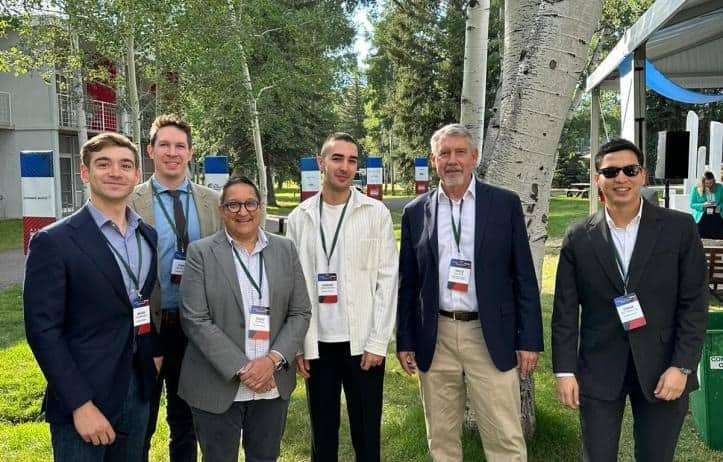
Student attendee Omar Aittakalla, who is in the International Development graduate program, reflected on his experience: “Attending the Aspen Security Forum has been one of the most enriching experiences of my summer. The opportunity to engage with leaders who have shaped, are shaping, and will shape the future of global security was truly unparalleled. I had the privilege to converse with a diverse array of experts, including seasoned policymakers, influential thought leaders, and rising stars in the field…Topics ranged from the strategic implications of space and cybersecurity to the geopolitical dynamics of great power competition. These discussions not only deepened my understanding of the difficulties we confront on a global scale but also instilled in me a sense of optimism…"
"As I reflect on my time at the Aspen Security Forum, I am left with a renewed sense of purpose and a deeper appreciation for the collaborative efforts required to navigate the complexities our world is facing and will continue to face in the future.”
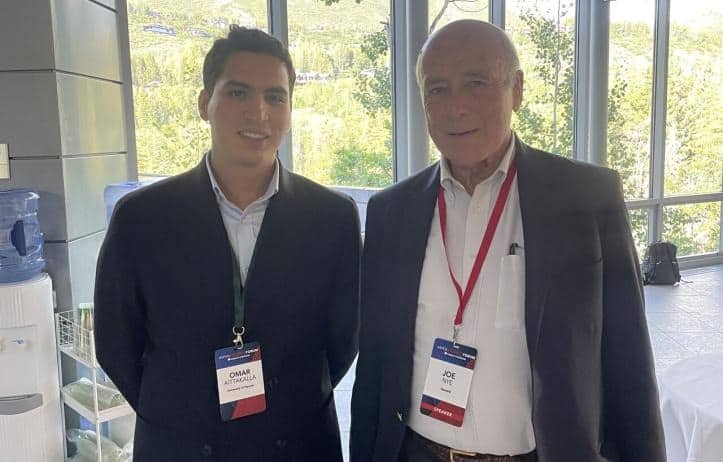
Micah DenBraber, another student attendee, said: “Attending the 2024 Aspen Security Forum was truly life changing. As an undergraduate international affairs major at Korbel, it was exhilarating to engage in conversations with top policy and business professionals in the national security space. A highlight of the forum was attending the Google AI security breakfast, where the new multi-stakeholder standards initiative, the Coalition for Safe AI (COSAI), was announced. This initiative brings together AI developers, industry leaders, academics, policymakers, and civil society organizations to promote the safe and responsible development, deployment, and governance of AI technologies. One of the most memorable moments for me was approaching a panelist during the AI security dialogue, where my initial nerves gave way to forming a valuable connection with someone who offered to support my BA thesis. As I enter my final undergraduate year, I’m excited to leverage the insights and connections gained at ASF to pursue opportunities in the global governance of artificial intelligence. I’m incredibly grateful to the Scrivner Institute and the Korbel School for facilitating this unmatched exposure to the nation’s leading national security practitioners and granting students such transformative opportunities.”

The Scrivner Institute and Korbel School are proud to partner with the Aspen Strategy Group in offering a transformative experience for our students and connecting a new generation of foreign policy leaders to ASG. We extend our thanks to the Aspen Strategy Group for their generous invitation for Korbel students to attend the Aspen Security Forum this summer and look forward to this mutually beneficial partnership in the years to come.
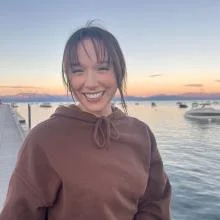
I graduated from the University of California, Santa Barbara in 2020 with a B.S. in Psychology and Brain Sciences as well as with a minor in Applied Psychology. I knew, at the time, that I wanted to work in the mental health sector and had the opportunity to work as a Behavioral Health Tech for Alsana, an eating disorder treatment center, in Santa Barbara. Three months into that role, I was promoted to Program Manager and in June 2022 when I left Alsana I was their Sr. Program Director. In that role I managed the operations of two treatment locations encompassing three different program levels. I bring this up not only because of how impactful this experience was but also because it catapulted the direction of my career. I was originally interested in pursuing clinical work however, this experience allowed me a comprehensive understanding of behavioral healthcare and insight into the many systems at work. I realized my passions and interests lay within understanding and impacting systems. As I researched different career paths relating to macro social change, I realized that an MPP and MSW would allow me to effectively combine my interests of social justice, systems work, and policy and eventually pursue a career in social policy. It was important to me that my education takes both a logistical and human rights approach to this work.
I feel extremely lucky to have been able to take classes with such incredible professors at both schools. While I am only in my second quarter of the MPP program, I found Dr. Barma’s Intro to Policy Analysis course to be incredibly impactful. Not only did it provide a great foundation to begin the MPP, but Dr. Barma provided the space to challenge and think critically about the content which cultivated thought-provoking meaningful conversations in class. For me, that class solidified that I am pursuing the right degree and made me excited about the rest of the program. Within the MSW program, I am currently taking The Prison Industrial Complex and Abolition course with Dr. Sarantakos. He designed this course to center the voices of people impacted by the carceral state which has been incredibly impactful. The course forces me and the class to sit in the discomfort of the many human rights violations of the prison system. I feel lucky to participate in classes like these where I get to analyze issues from both a policy and grassroots lens.
I am currently exploring my career goals and am open to a variety of opportunities. My main priority is ensuring that the work I do is meaningful and impactful. One topic that especially interests me is healthcare policy. I would be very excited to work in that field. The dual degree has been great not only in terms of skillset development for my future career but also in exposing me to different organizations and role possibilities because of doing research for classes and talking to professors.
Given that many students in the MSW program are pursuing clinical or micro-social work roles, the first year of the program attempted to cover a vast variety of introductory topics in social work. Comparatively, I have found the first year of the MPP program to be more focused to ensure students have a strong basic understanding of policy. Both programs have taught a lot; however, in my experience, there is a greater focus on theory in the MSW vs. a greater focus on skills in the MPP. The programs and classes have felt compatible and, as a result, have allowed me to deepen my understanding and approach topics from a variety of perspectives. For example, my Cost-Benefit Analysis course at Korbel and my Prison Industrial Complex and Abolition course at GSSW discuss issue analysis in vastly different ways which has given me a great basis for my Cost-Benefit Analysis quarter-long project for which I’ve chosen a topic relating to sentencing.
Outside of school I work part-time for the Denver Public School system as their Operations Coordinator for their Exceptional Student Services Department. This department includes student services including nursing, social work, psych, substance abuse prevention, section 504, special education, and more. I support these sub-departments with logistics and project management. This work has given me greater insight into the challenges and benefits of working in large, bureaucratic institutions.
I love finding great places to eat. I would highly recommend Taste of Thailand on Broadway and Lucky Noodles on Colfax for great Thai. My absolute favorite restaurant in Denver is called Q House – I can’t recommend it enough.
Copyright ©2025 University of Denver | All rights reserved | The University of Denver is an equal opportunity institution